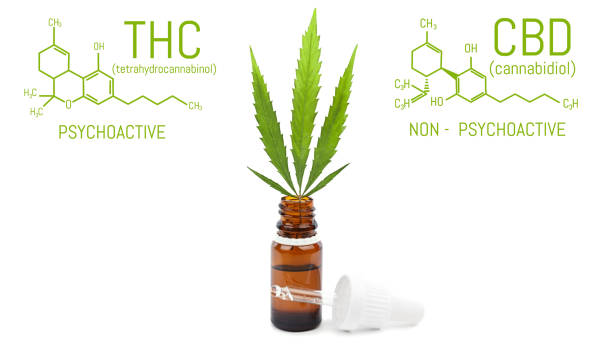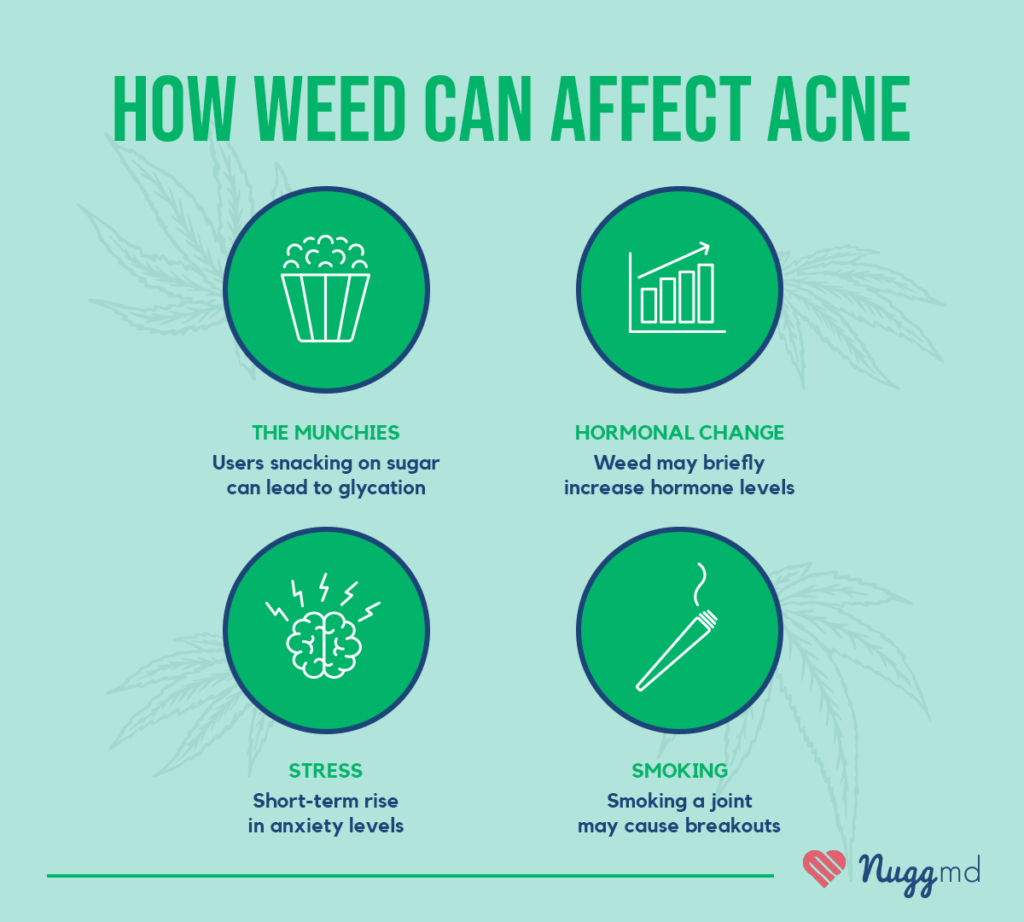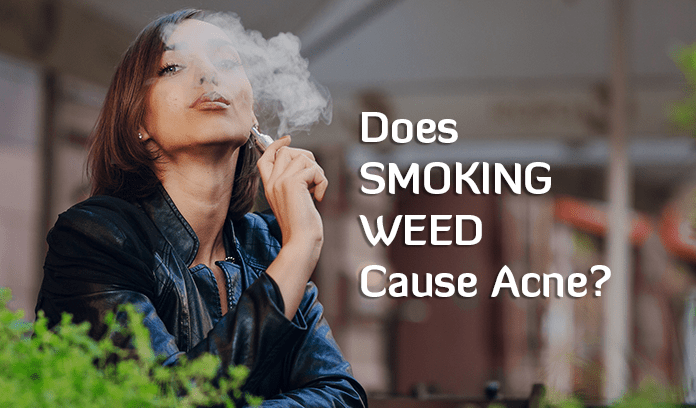In recent years, many marijuana users have raised the question: “Does smoking weed cause acne?” To address this query comprehensively, it’s essential to delve into the nature of weed, its components, and its potential effects on skin health.
Weed, commonly referred to as marijuana, is a psychoactive drug derived from the Cannabis plant. It contains various chemical compounds, including tetrahydrocannabinol (THC) and cannabidiol (CBD). While THC is responsible for the euphoric effects associated with marijuana use, CBD is known for its potential therapeutic properties.
What Is Marijuana?
Marijuana exists in several forms, such as dried leaves, flowers, stems, and seeds. It is often consumed by smoking, vaporizing, or ingesting. Upon consumption, marijuana interacts with the body’s endocannabinoid system, affecting neurotransmitter release and producing various physiological and psychological effects.

Components of Weed and Marijuana
Weed, also known as marijuana, contains various chemical compounds that contribute to its psychoactive and therapeutic effects. The primary components include:
- Tetrahydrocannabinol (THC):
- This is the main psychoactive compound in marijuana responsible for the “high” sensation experienced by users. THC interacts with cannabinoid receptors in the brain, altering neurotransmitter release and inducing euphoria.
- Cannabidiol (CBD):
- Unlike THC, CBD is non-psychoactive and is known for its potential therapeutic properties. It interacts with the endocannabinoid system to modulate various physiological functions, such as pain perception, inflammation, and mood.
- Other Cannabinoids:
- Marijuana contains numerous other cannabinoids, such as cannabinol (CBN), cannabigerol (CBG), and cannabichromene (CBC). Each cannabinoid may exert unique effects on the body and contribute to the overall pharmacological profile of marijuana.
- Terpenes:
- These are aromatic compounds found in marijuana that give the plant its distinctive smell and flavor. Terpenes may also have therapeutic effects and interact synergistically with cannabinoids in what is known as the “entourage effect.”

Factors Contributing to the Potential Association Between Cannabis Use and Acne
While the exact relationship between cannabis use and acne is still being researched, several factors may contribute to a potential association:
- Hormonal Changes:
- Cannabis consumption can influence hormone levels in the body, including testosterone and estrogen. Fluctuations in hormone levels may affect sebum production in the skin, potentially leading to acne development.
- Increased Sebum Production:
- THC, the psychoactive component of marijuana, has been shown to stimulate the sebaceous glands, leading to an increase in sebum production. Excess sebum can clog pores and create an environment conducive to acne formation.
- Inflammation:
- Some studies suggest that cannabinoids, particularly THC, may have pro-inflammatory effects on the skin. Chronic inflammation is a known contributing factor to acne, as it can exacerbate existing lesions and promote the development of new ones.
- Genetic Predisposition:
- Individuals with a genetic predisposition to acne may be more susceptible to the potential adverse effects of cannabis use on skin health. Genetic factors influence various aspects of acne pathogenesis, including sebum production, inflammation, and the colonization of acne-causing bacteria.
- Lifestyle Factors:
- Other lifestyle factors associated with cannabis use, such as poor dietary choices, stress, and lack of skincare hygiene, may also contribute to acne development. Adopting a healthy lifestyle and skincare regimen can help mitigate these risk factors and promote clearer skin.
Understanding the interplay between cannabis use and acne requires further research to elucidate the underlying mechanisms and determine the extent of their association. By addressing these factors comprehensively, researchers can develop targeted interventions to manage acne in cannabis users effectively.
Does Smoking Weed Cause Acne?
The relationship between smoking weed and acne is a topic of debate among researchers. While scientific evidence is limited and inconclusive, so Limited evidence leaves the question, ‘Does Smoking Weed Cause Acne?’ unanswered.”
Several factors may contribute to a potential association:
1. Hormonal Influence:
THC, the psychoactive compound in marijuana, can affect hormone levels in the body. Fluctuations in hormones, particularly androgens, are known to contribute to the development of acne.
2. Impact on Sebum Production:
THC may influence the production of sebum, the oily substance produced by the skin’s sebaceous glands. Excessive sebum production can clog pores and contribute to acne formation.
3. Smoking Method:
The method of marijuana consumption may also play a role. Smoking, whether through joints, pipes, or bongs, exposes the skin to heat and potentially harmful chemicals, which can exacerbate skin issues.
The Role of Weed
Apart from its potential impact on acne, weed may exert other effects on skin health. Some anecdotal evidence suggests that topical application of CBD-infused products may alleviate certain skin conditions, such as eczema and psoriasis. However, further research is needed to confirm these claims.
Is Smoking Weed Bad for Your Skin?
While marijuana use may have potential benefits, it’s crucial to consider its possible adverse effects on skin health. Smoking weed can expose the skin to harmful toxins and carcinogens, which may accelerate skin aging and increase the risk of skin cancer. Additionally, chronic marijuana use may impair wound healing and compromise skin integrity.
Does Weed Have Any Benefit for Skin?
While some speculate about the negative effects of smoking weed on skin health, it’s essential to consider the potential benefits as well:
1. Anti-inflammatory Properties:
CBD, a non-psychoactive compound in marijuana, possesses anti-inflammatory properties that may help alleviate skin inflammation associated with conditions like acne.
2. Stress Reduction:
Marijuana consumption is often linked to stress reduction and relaxation. Since stress can exacerbate acne, managing stress levels through weed consumption may indirectly benefit skin health.
3. Treatment Potential:
Research suggests that cannabinoids found in marijuana could have therapeutic potential for various skin conditions, including acne. However, more studies are needed to understand the precise mechanisms and efficacy.

Conclusion
In conclusion, the question of whether smoking weed causes acne remains a subject of debate among researchers and healthcare professionals. While some studies suggest a potential association between cannabis use and acne development, further research is needed to elucidate the underlying mechanisms. Moreover, it’s essential to consider the potential benefits and risks of weed consumption for overall skin health.
